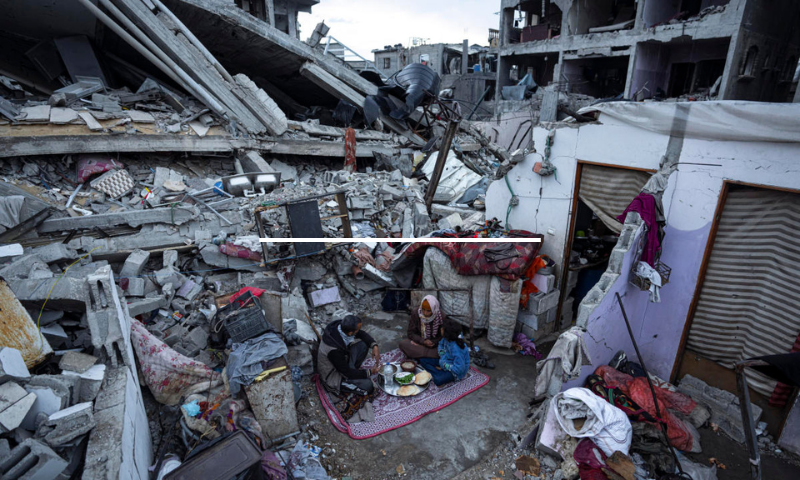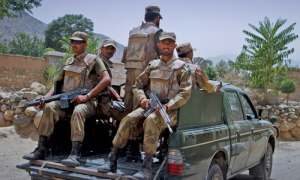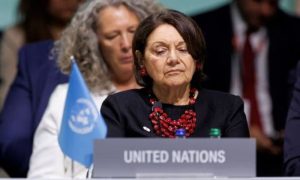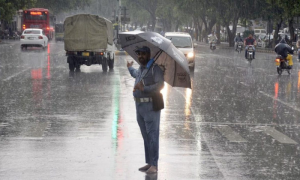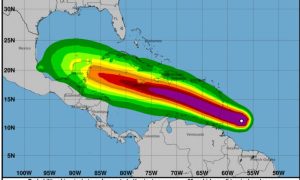GAZA: Israeli airstrikes and ground invasions rocked Gaza on Wednesday as the Israeli army warned it had readied for a potential offensive against the Lebanese Hezbollah movement on the northern front. In Rafah, western Gaza, Israeli bombardment left at least seven people dead, according to local medics and witnesses.
The health ministry in Gaza said Wednesday that at least 37,396 Palestinians, mostly women and children, have been killed in the territory during more than eight months of Israeli bombardment.
The toll includes at least 24 deaths in the past 24 hours, a ministry statement said, adding that a total of 85,523 Palestinian people had been injured in the Gaza Strip since on October 7 last year.
Despite the Israeli military announcing a daily humanitarian “pause” in military bombardment on a key road in eastern Rafah, a UN spokesperson noted that this had not resulted in increased aid reaching those in need. The ongoing conflict, sparked by a Palestinian resistance group Hamas’s unprecedented attack on October 7, has led to severe humanitarian conditions in Gaza and repeated UN warnings of famine.
The Rafah border crossing between Gaza and Egypt remains closed after Israeli troops seized the Palestinian side in early May. The nearby Kerem Shalom crossing on the Israeli border is also operating with limited functionality due to ongoing Israeli shelling. UN Deputy Spokesman Farhan Haq reported a recent improvement in aid delivery to northern Gaza but highlighted a drastic deterioration in the south, where basic commodities are available but largely unaffordable for many residents.
The conflict has escalated regional tensions. The Israeli military, engaged in near-daily cross-border fire with Hezbollah since October, announced on Tuesday that operational plans for an offensive in Lebanon were approved.
Overnight, Israeli warplanes struck Hezbollah sites in southern Lebanon, and a drone attack near Metula was reported, claimed by Hezbollah, targeting Israeli troops. Hezbollah confirmed the death of two of its fighters. Lebanese state media reported Israeli strikes on several southern areas, including the border village of Khiam.
Amid rising tensions, the Israeli army’s announcement of an offensive plan in Lebanon and warnings from Foreign Minister Israel Katz of Hezbollah’s destruction in a “total war” coincided with US envoy Amos Hochstein’s visit to the region to promote de-escalation. Meanwhile, Syrian state media reported an Israeli strike on military sites in southern Syria, killing an army officer.
In Gaza, the Islamic Jihad group engaged Israeli troops amid shelling in western Rafah. Witnesses reported Israeli military vehicles entering Rafah’s neighborhood, leading to nighttime gun battles. Central Gaza also experienced fighting, with artillery shelling and heavy gunfire reported in Gaza City’s Zeitun neighborhood.
The ongoing conflict has seen relentless Israeli bombardment in Gaza since October 7, resulting in at least 37,396 Palestinian deaths, mostly women and children, according to Gaza’s health ministry. The ministry reported 24 deaths in the past day alone.
US President Joe Biden called for the implementation of a ceasefire plan during the Eid Al-Adha holiday. Hochstein emphasized that the plan would lead to the end of the conflict in Gaza, which could also reduce tensions between Israel and Hezbollah. However, mediation efforts by the US, Qatar, and Egypt have stalled since a one-week truce in November that saw hostages freed and increased aid deliveries into Gaza.
Israeli Prime Minister Benjamin Netanyahu faces mounting domestic criticism over his handling of the Gaza conflict and the hostage crisis. Thousands of protesters gathered in front of parliament in Jerusalem, demanding early elections and the resumption of truce talks. In response, Netanyahu criticized the US for “withholding weapons and ammunition to Israel,” a claim rejected by the White House.
UN Human Rights Chief Volker Turk issued a report detailing six “indiscriminate and disproportionate” Israeli strikes that killed at least 218 people in the first two months of the conflict. The report accused Israel of using heavy bombs in densely populated areas, likely constituting prohibited indiscriminate attacks. Turk emphasized the ongoing violations of warfare requirements to minimize civilian harm and called for accountability in the Israeli bombing campaign.
More than six months since the attacks featured in the report, “there is no clarity as to what happened or steps toward accountability”, Turk said.









